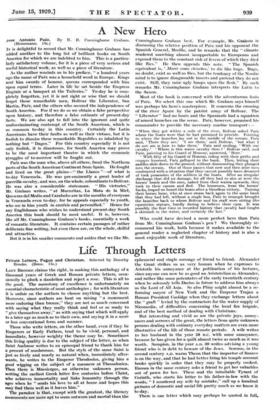A New Hero Jose Antonio Paez. By R. B. Cunninghame
Graham. (Heinemann. 15s.)
IT is delightful to record that Mr. Cunninghame Graham has added another to the long list of brilliant books on South America for which we are indebted to him. This is a particu- larly satisfactory volume, for it is a piece of very serious and useful historical work, as well as a piece of literature.
As the author reminds us in his preface, " a hundred years ago the name of Pak was a household word in Europe. Kings sent him swords of honour, queens corresponded with him upon equal terms. Later in life he sat beside the Empress Eugenie at a banquet at the Tuileries." To-day he is com- pletely forgotten, yet it is not right or wise that we should forget those remarkable men, Bolivar the Liberator, San Martin, Paez, and the others who secured the independence of South America. For if we do so we obtain a false perspective upon history, and therefore a false estimate of present-day facts. We are also apt to fall into the ignorant and quite undiscriminating contempt of the South American, which is so common to-day in this country. Certainly the Latin Americans have their faults as well as their virtues, but it is foolish to dismiss these remarkable Republics as inhabited by nothing but Dagos." For this country especially it is not only foolish, it is disastrous, for South America may prove to be the most important theatre in which the economic struggles of to-morrow will be fought out.
Pa& was the man who, above all others, freed the Northern parts of the South American Continent from Spain. He fought and lived on the great plains—" the Llanos "—of what is to-day Venezuela. He was pre-eminently a great leader of guerrilla cavalry, and was, on the whole, subordinate to Bolivar. He was also a considerable statesman. " His victories," Mr. Graham writes, " at Mucuritas, La Mata de In Miel, Queseras del Medio and Carabobo are in the mouths of everyone in Venezuela even to-day, for he appeals especially to youth, who see in him youth in excelsis and personified." Hence for any Englishman who wishes to understand present-day South America this book should be most useful. It is, however, like all Mr. Cunninghame Graham's books, essentially a work of romantic literature. It contains certain passages of rather deliberate fine writing, but even these are, on the whole, skilful and attractive.
But it is in his smaller comments and asides that we like Mr.
Cunninghame Graham best. For elk:ample, Mr. Graham is discussing the relative position of Paez and his opponent the Spanish General, Morino, and he remarks that the " climate rendered marching almost insupportable to Europeans and exposed them to the constant risk of fevers of which they died like flies." He then appends this note. " The Spanish equivalent is, Morir canto chinches,' to die like hugs. Bugs, no doubt, exist as well as flies, but the tendency of the Nordic mind is to ignore disagreeable insects and pretend they do not exist. Still, they raise ugly lumps upon the flesh." By such remarks Mr. Cunninghame Graham interprets the Latin to the Saxon.
Most of the book is concerned with the adventurous feats of Paez. We select this one which Mr. Graham says himself was perhaps his hero's masterpiece. It concerns the crossing of the river Apure by the patriot army of Bolivar. The " Liberator" had no boats and the Spaniards had a squadron of armed launches on the scene. Paez, however, promised his commander to provide the necessary marine transport :---
"When they got within a mile of the river, Bolivar asked Pa& where the boats were that he had promised to provide. Pointing to where the launches lay out in the middle of the stream, Pat said, ' There they are.' I see them,' said Bolivar, ' but what I do not see is how to take them.' Pa& said smiling, ' With our cavalry.' Where is this water cavalry then ? Bolivar said, and Paez, pointing to his Guard of Honour, answered, ' Here.'
" With fifty of his Guard of Honour, riding with their girths and crupper loosened, Paez galloped to the bank. Then, letting their saddles slide down to the ground, without dismounting they plunged into the stream. One of those panics that now and then seize men confronted with a situation that they cannot possibly have dreamed of took possession of the soldiers in the boats. After an irregular discharge that did no damage, for all they had to aim at were the horses' heads and the men, naked from their waists upwards, they took to their canoes and fled. The horsemen, from the horses' backs, leaped on board the boats after a bloodless victory. Turning their horses loose, who at once swam back again to the same bank that they had left, without a single loss, Paez in triumph brought the launches back to where Bolivar and his staff were sitting like equestrian statues, hardly daring to believe their eyes. It was possibly the first time in recorded history that cavalry had fought a skirmish in the water, and certainly the lest."
Who could have devised a more perfect hero than Pak from Mr. Cunninghame Graham's pen ? We thoroughly re- commend his work, both because it makes available to the general reader a neglected chapter of history and is also a most enjoyable work of literature.






































 Previous page
Previous page